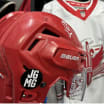Jake Muzzin was acquired by the Toronto Maple Leafs in a trade from the Los Angeles Kings for forward Carl Grundstrom, the rights to defenseman Sean Durzi and a first-round pick in the 2019 NHL Draft on Monday.
Although the Kings have a minus-36 goal differential, worst in the NHL, Muzzin ranked first among Los Angeles defensemen with a plus-16 shot attempts differential (SAT), including a team-best plus-82 SAT when trailing. His 1.17 points per 60 minutes and his 78 shots on goal were second among Kings defensemen behind Drew Doughty (1.26; 96). Muzzin's positive possession metrics and his offensive contributions are impressive considering his 5-on-5 zone start percentage was the lowest among Kings defensemen to play at least 50 games (42.29 percent). These metrics indicate that although Muzzin started the majority of shifts in his own zone and faced high-quality competition, he still generated positive possession for his team.
RELATED: [Fantasy spin: Muzzin to Maple Leafs | Muzzin traded to Maple Leafs by Kings]
In Toronto, Muzzin is expected to play on a pair with Morgan Rielly, who leads NHL defensemen with 35 even-strength points. It's worth noting that either Rielly or Muzzin will have to play on his off side, but because Muzzin was acquired almost one month prior to the 2019 NHL Trade Deadline on Feb. 25 at 3 p.m. ET, there will be plenty of time to acclimate to the new pair and systems. Either way, Muzzin's defensive responsibilities should help Rielly, whose plus-3 SAT is fifth among Maple Leafs defensemen. The low possession metrics likely are caused by Rielly facing the highest quality of competition among his teammates, especially in the Atlantic Division against elite forwards Patrice Bergeron, Brad Marchand and David Pastrnak of the Boston Bruins, and Nikita Kucherov, Brayden Point and Steven Stamkos of the Tampa Bay Lightning.
Muzzin, whose plus-2,010 SAT since entering the NHL in 2010-11 ranks second among defensemen behind longtime partner Doughty's plus-2,505, should help offset the quality of competition faced. When compared to Rielly's previous partners, Muzzin has the best possession metrics by a significant margin:
2017-18: Ron Hainsey (minus-119)
2016-17: Nikita Zaitsev (minus-37)
2015-16: Matt Hunwick (minus-112)
2014-15: Roman Polak (minus-176)
2013-14:
Cody Franson
(minus-233), Jake Gardiner (minus-184), Tim Gleason (minus-240)


















